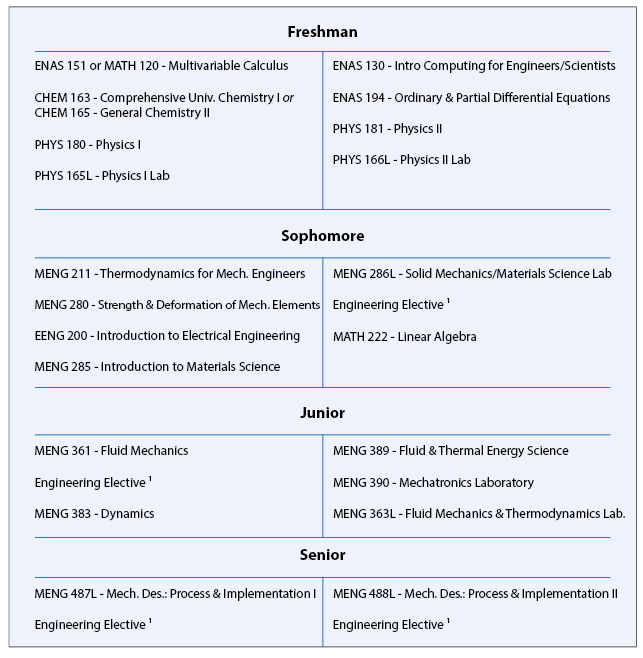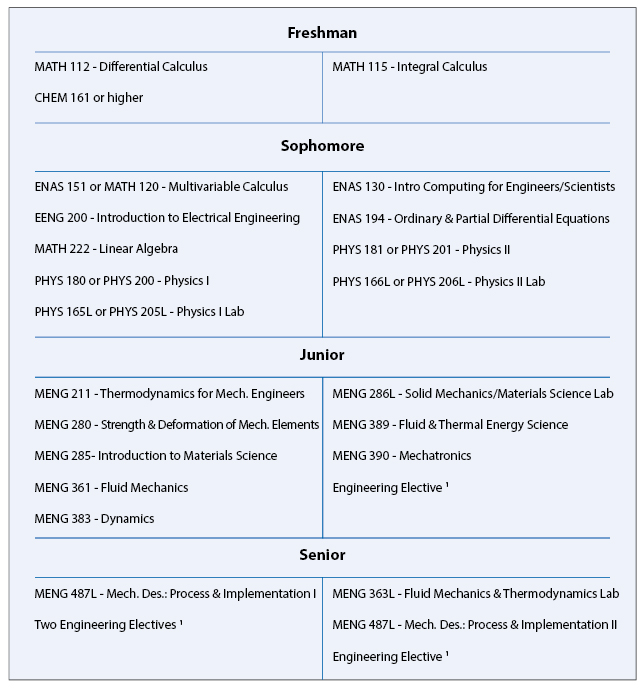ABET-accredited B.S. in Mechanical Engineering:This degree program is appropriate for students who plan on careers as practicing engineers in industry, consulting firms, and government. This program is also ideal for students who are considering a career in research or academia and plan to pursue graduate studies in Mechanical Engineering and related disciplines. Accredited by the Engineering Accreditation Commission of ABET, www.abet.org.
Examples of typical course sequences are presented below. Consultation with the program’s Director of Undergraduate Studies is expected to ensure the correct courses are taken by each enrolled student.
No courses may be taken Cr/D/F and count toward one of the Mechanical Engineering degree options.
ABET-accredited B.S. in Mechanical Engineering Typical Course Sequence
Course Sequence for students with one year of Calculus
This program requires 19 technical term courses (17.5 credits) beyond the 8 prerequisite courses (MATH 112, MATH 115, ENAS 151 (or MATH 120), PHYS 180 (or PHYS 200), PHYS 181 (or PHYS 201), PHYS 165L (or PHYS 205L), PHYS 166L (or PHYS 206L), and CHEM 161 or higher (or AP score of 4 or 5).
For students who enter Yale with the equivalent of one year of calculus in high school, a typical ABET-accredited B.S. in Mechanical Engineering degree curriculum might include the following engineering specific courses in partial fulfillment of the thirty-six courses and distributional requirements of Yale College:

- Four approved technical electives chosen from the following: BENG 351 - Biotransport and Kinetics, BENG 353 - Introduction to Biomechanics, BENG 405 - Biotechnology and the Developing World, BENG 411 - Biomedical Microtechnology & Nanotechnology, BENG 421 - Fundamentals of Medical Imaging, BENG 434 - Biomaterials, BENG 435 - Biomaterials - Tissue Interactions, CENG 300 - Chemical Engineering Thermodynamics, CENG 315 - Transport Phenomena, EENG 201 - Introduction to Computer Engineering, EENG 406 - Photovoltaic Energy, ENAS 400 - Making It, MENG 365 - Chemical Propulsion Systems, MENG 386 - Electrical, Optical, and Magnetic Properties of Materials, MENG 400 - Computer-Aided Engineering, MENG 403 - Introduction to Nanomaterials & Nanotechnology, MENG 404 - Medical Device Design, MENG 386 - Electrical, Optical, and Magnetic Properties of Materials, MENG 440 - Applied Numerical Methods for Algebraic Systems, Eigensystems, and Function Approximation, MENG 441 - Applied Numerical Methods for Differential Equations, MENG 459 - Neuromuscular Biomechanics, MENG 463 - Theoretical Fluid Dynamics, MENG 464 - Forces on the Nanoscale, MENG 469 - Aerodynamics, and other technical courses in consultation with the Director of Undergraduate Studies. One term course, either MENG 471, 472, 473, or 474 may be counted as one of the four technical electives.
more info
ABET-accredited B.S. in Mechanical Engineering Typical Course Sequence
Course Sequence for students who start with MATH 112
This program requires 19 technical term courses (17.5 credits) beyond the 8 prerequisite courses (MATH 112, MATH 115, ENAS 151 (or MATH 120), PHYS 180 (or PHYS 200), PHYS 181 (or PHYS 201), PHYS 165L (or PHYS 205L), PHYS 166L (or PHYS 206L), and CHEM 161 or higher (or AP score of 4 or 5).
For students that start with MATH 112, a typical ABET-accredited B.S. in Mechanical Engineering degree curriculum might include the following engineering specific courses in partial fulfillment of the thirty-six courses and distributional requirements of Yale College:

- Four approved technical electives chosen from the following: BENG 351 - Biotransport and Kinetics, BENG 353 - Introduction to Biomechanics, BENG 405 - Biotechnology and the Developing World, BENG 411 - Biomedical Microtechnology & Nanotechnology, BENG 421 - Fundamentals of Medical Imaging, BENG 434 - Biomaterials, BENG 435 - Biomaterials - Tissue Interactions, CENG 300 - Chemical Engineering Thermodynamics, CENG 315 - Transport Phenomena, EENG 201 - Introduction to Computer Engineering, EENG 406 - Photovoltaic Energy, ENAS 400 - Making It, MENG 365 - Chemical Propulsion Systems, MENG 386 - Electrical, Optical, and Magnetic Properties of Materials, MENG 400 - Computer-Aided Engineering, MENG 403 - Introduction to Nanomaterials & Nanotechnology, MENG 404 - Medical Device Design, MENG 386 - Electrical, Optical, and Magnetic Properties of Materials, MENG 440 - Applied Numerical Methods for Algebraic Systems, Eigensystems, and Function Approximation, MENG 441 - Applied Numerical Methods for Differential Equations, MENG 459 - Neuromuscular Biomechanics, MENG 463 - Theoretical Fluid Dynamics, MENG 464 - Forces on the Nanoscale, MENG 469 - Aerodynamics, and other technical courses in consultation with the Director of Undergraduate Studies. One term course, either MENG 471, 472, 473, or 474 may be counted as one of the four technical electives.
more info



